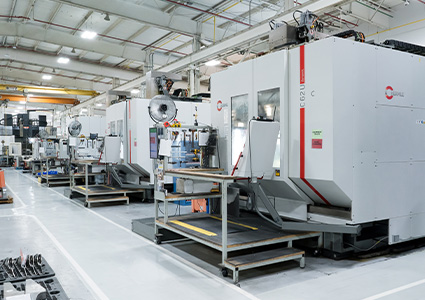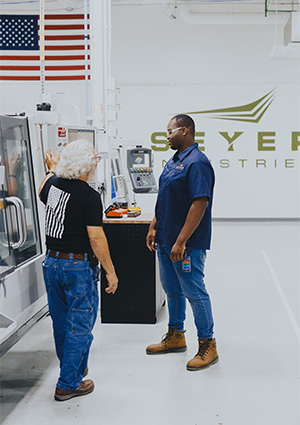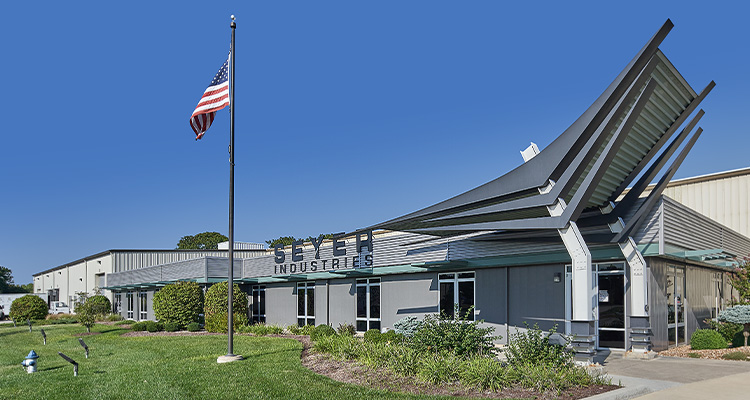The aerospace industry is in safe hands with Seyer Industries’ innovative apprenticeship programs and talent development initiatives
Combining over six decades of experience with a forward-thinking mindset, Seyer Industries (Seyer) delivers superior products and value-added solutions to its customers. From complex support equipment to aircraft structures, the company is committed to driving aerospace innovation and building the future of flight. “Seyer was founded by my grandfather in 1957,” begins Chris Seyer, who serves as Chief Executive Officer.
 “Starting out as a tool and die maker for a shoemaker, my grandfather became displeased with working for somebody else, leading him to establish Seyer early on in his career. At the time, he would serve any customers that came to him, whether in transportation, mining, aerospace, or any other industry. The company prospered for many years, but it wasn’t until my dad joined in the late 1970s that the company truly focused on aerospace. While my grandfather was more of a hands-on leader, my dad had more managerial training and introduced business processes into operations. Under his leadership, we matured and adopted lean manufacturing principles in the late 1990s. In 2005, I joined the business shortly followed by my brother Mark in 2007. Together, we took over day-to-day leadership in 2018. As CEO, I handle pre-award functions, including sales, contracts, human resources, accounting, finance, and strategy, while my brother is operationally focused, ensuring the production of high-quality parts and on-time delivery,” he continues.
“Starting out as a tool and die maker for a shoemaker, my grandfather became displeased with working for somebody else, leading him to establish Seyer early on in his career. At the time, he would serve any customers that came to him, whether in transportation, mining, aerospace, or any other industry. The company prospered for many years, but it wasn’t until my dad joined in the late 1970s that the company truly focused on aerospace. While my grandfather was more of a hands-on leader, my dad had more managerial training and introduced business processes into operations. Under his leadership, we matured and adopted lean manufacturing principles in the late 1990s. In 2005, I joined the business shortly followed by my brother Mark in 2007. Together, we took over day-to-day leadership in 2018. As CEO, I handle pre-award functions, including sales, contracts, human resources, accounting, finance, and strategy, while my brother is operationally focused, ensuring the production of high-quality parts and on-time delivery,” he continues.
As Seyer began to focus more and more on catering to the needs of the aerospace industry, it expanded its product portfolio to provide high-quality aircraft components for a wide range of applications. “Our aerospace product range comprises military support equipment, which encompasses specialized tools used for the maintenance, transportation and handling of military aircraft. Examples include engine removal trailers, missile adapters, hoisting units, transportation dollies, and other specialized items required to maintain aircraft. Additionally, aerostructures, the parts making the skeleton of the aircraft, make up half of our business. Put simply, we produce anything mechanical, namely components attached to the fuselage, wings, tail, canopy, landing gear, and more, rather than specializing in specific areas of the aircraft. Finally, we also manufacture mechanical structures for the maritime defense segment, which accounts for a small percentage of our business,” Chris says.
Investing in people
Committed to supporting a wide range of clients, Seyer is dedicated to ensuring its future capability by training the next generation of engineers through its apprenticeship program. “Over the past six-to-eight years, we have made significant investments in multiple in-house apprenticeship programs. Our flagship program is the Industry Consortium for Advanced Technical Training (ICATT) apprenticeship program, which is administered in Chicago through the German American Chamber of Commerce. It is a European style apprenticeship program that has been translated into English, but still follows the same curriculum, tests, and training. In 2018, we were the first company in Missouri to introduce this three-year program.
“Our apprentices are typically high school graduates who spend three days a week on our site receiving hands-on training with machines, and two days a week at Southwestern Illinois College for classroom training. Not only do we pay for their classroom training, but our apprentices are also paid as employees for the time they spend working with us as part of the program. Thus, when they graduate from the program, they have no debt and a guaranteed job for two years, in line with our commitment to them. To date, 100 percent of our apprentice graduates are still employed with us after five years, and we are extremely proud of that. Since starting with two apprentices in our first class, we have expanded the program and brought in six apprentices in our first-year class in 2024. Next year, we will increase the number to eight apprentices per year. If we were to maintain this pace, we will have 24 apprentices in the program by 2027,” he enlightens.
Southwestern Illinois College for classroom training. Not only do we pay for their classroom training, but our apprentices are also paid as employees for the time they spend working with us as part of the program. Thus, when they graduate from the program, they have no debt and a guaranteed job for two years, in line with our commitment to them. To date, 100 percent of our apprentice graduates are still employed with us after five years, and we are extremely proud of that. Since starting with two apprentices in our first class, we have expanded the program and brought in six apprentices in our first-year class in 2024. Next year, we will increase the number to eight apprentices per year. If we were to maintain this pace, we will have 24 apprentices in the program by 2027,” he enlightens.
Succession planning
In addition to apprenticeships, Seyer runs a new program through the Department of Labor. “So far, we have only been participating in the Department of Labor apprenticeship program for a year and currently have one apprentice. This program offers a different training path than ICATT, but we are hoping to expand it in 2025 by bringing in several more apprentices. Ultimately, our goal is to have 20-to-30 apprentices in the program at any given time in the next couple of years. The reason we are doing this is because it is increasingly difficult to find good technical talent these days. Rather than relying on external sources to get fresh talent, we have decided to take the initiative to find, train, and develop our own workforce to have more control over our own destiny than we did in the past,” Chris adds.
To support its staff and meet increased demand, Seyer has invested in technologies that will fuel its growth. “We have invested $12 million in new machinery, including eight CNC machines, an enormous piece of machinery for machining large titanium parts, and automated systems. In addition, we have purchased adjacent properties and another business in Missouri within the past month,” he ends.
